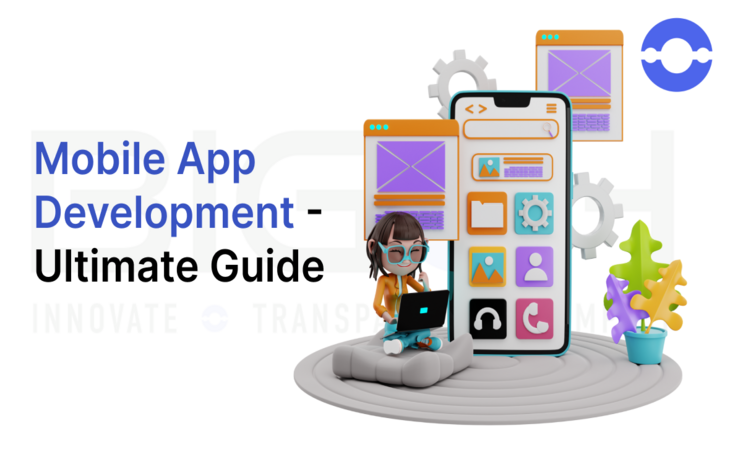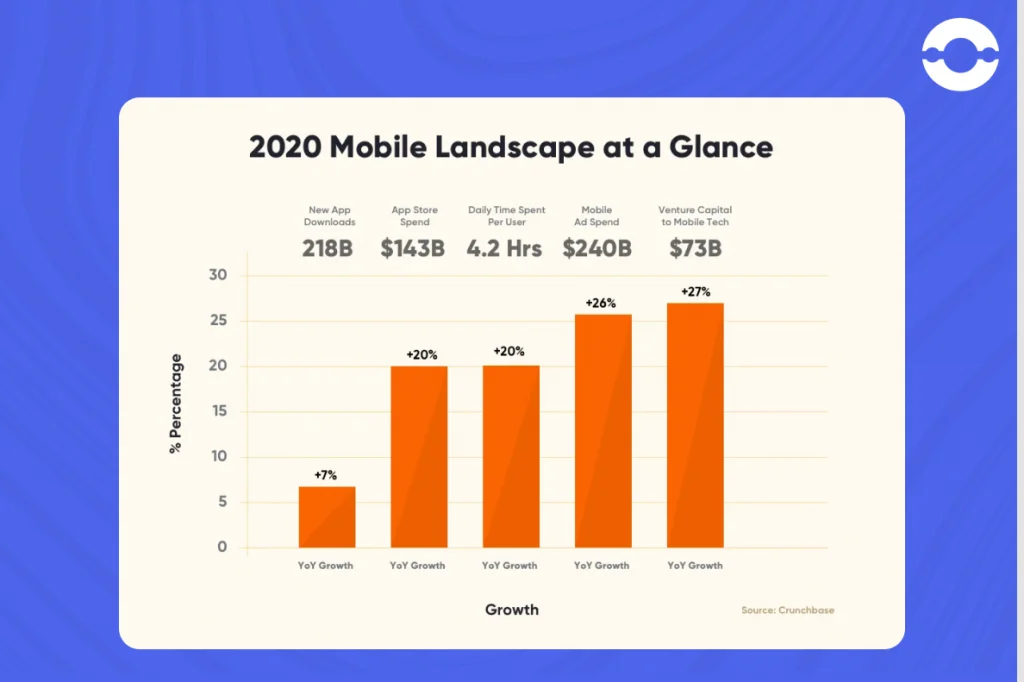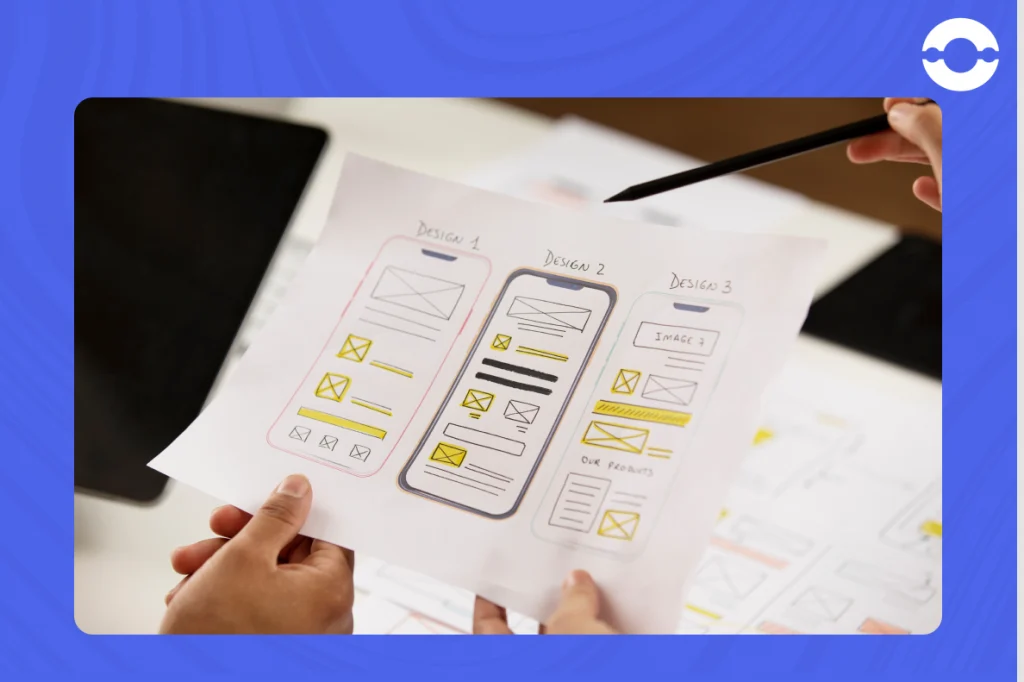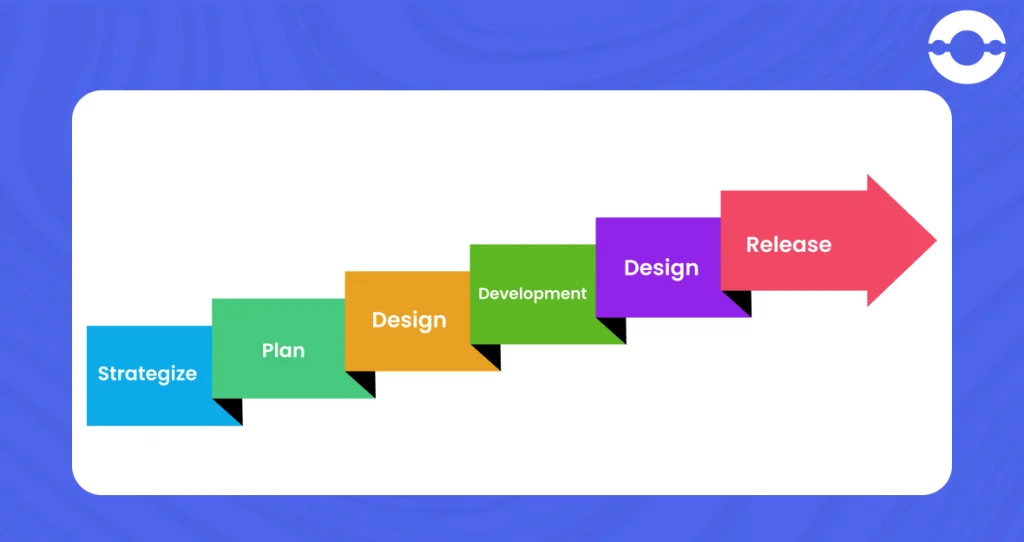
Mobile apps make human life less challenging and hence, more comfortable. In fact, with just one click, one can indulge in anything and everything. Due to these reasons, mobile app development is also on the rise.

In fact, the global mobile app development platforms market is expected to reach a whopping $44.3 trillion by 2027.
A business that wants to explore, diversify its presence, and in addition, expand its operations, seeks mobile app development for all these reasons. In fact, all contemporary behemoths use mobile apps to maintain market dominance. Through just one mobile app, a business benefits extensively.
Thus, starting with the basics, we provide you with a complete and ultimate app development guide to make your process of mobile app development smooth and well-researched.
What is Mobile App Development?

Mobile App development is the process of developing software that is compatible with smartphones and digital assistants. Businesses undertake this process to offer utility to users and also enhance its engagment with them. While the process involves many small steps, certain key steps such as writing and testing the code and creating a suitable UI/UX design, are important. These steps ensure the smooth functioning of the product.
While app development is similar to traditional software development in many aspects, the key differentiating factor is the ability of mobile applications to leverage native features on a device. Mobile apps can make use of mobile features such as GPS, Bluetooth, a camera, a microphone, and other functions that are in-built into a smartphone, to enhance user experience.
While there are various platforms to host a mobile app, Android and iOS are the most popular and targeted ones.
Mobile app development is growing at an unparalleled rate. Previously confined to certain major industries, it now covers nearly all businesses across multiple industries. For this reason, mobile app revenue would cross $613 billion by 2023.
From retail, and e-commerce to insurance, healthcare, and government, mobile apps have optimized business operations effectively enough to boost sales and hence, revenue.
In fact, as per reports, smartphone users spend 90% of their screen time using mobile apps. And for this reason, businesses invest in the development of mobile apps.
Advantages of Building Mobile Apps
- Mobile apps act as direct-to-customer marketing channels; easy communication through notifications, the announcement of offers, and promotional campaigns on the mobile app
- They enhance user experience; businesses can personalize the user journey
- Mobile apps offer a higher conversion rate; mobile apps help businesses to identify and thus, cater to the target audience. Moreover, it can be used to acquire both top-of-the-funnel (ToFu) and bottom-of-the-funnel (BoFu) users.
- Mobile apps facilitate brand recognition and also brand awareness
- Mobile apps offer high efficiency and increased revenues; mobile apps work faster than the web, as the data stored locally on these devices can be retrieved more easily. Furthermore, users can set their preferences and can view what they desire more conveniently.
- Mobile apps help businesses to maintain customer loyalty
Now that we have seen how important it is to build a mobile app for a business, let’s look at different platforms to develop a mobile app. This is an important aspect of the mobile app development guide.
Mobile Apps And Device Platforms
Developers typically build mobile apps for the two most sought-after platforms, iOS and Android. Developers have built more than 1.5 million applications for both platforms so far.
Both platforms involve the usage of different software development kits (SDKs) and different development toolchains.
In fact, around 70% of smartphones have Android as their operating system. Moreover, the Google Play Store has fewer restrictions than the Apple App Store for mobile app deployment.
Whereas mobile apps developed for the iOS platform have far fewer devices that need support. As a result, this facilitates easy optimization. Furthermore, user retention is generally higher for iOS applications than for Android ones.
Thus, while both platforms dominate with a global market share of more than 50%, they both cater to a different set of audiences. Thus, a business needs to decide its target audience and intended use case and choose the platform accordingly.
For example, if you need to build an app for internal organizational purposes, then you need to build a cross-platform mobile app considering that different employees would be using different operating systems.
Similarly, if you are building a consumer-facing mobile app, then you must study your target and potential audience and choose the platform as per user preferences and behavior.
While these were some use cases that have an impact on platform selection. Similarly, geography and cultural factors might also affect these use cases and user behavior.
Let’s now move to a more detailed topic i.e., types of mobile apps, in this ultimate guide to mobile app development.
Types of Mobile Apps
A guide to mobile app development would not make much sense without understanding the types of mobile apps that exist in the market. There are four categories that divide mobile app platforms, namely:
| Types of mobile apps | Definition | Pros | Cons |
| Native apps | They are specific to a certain device or platform and run directly on the operating system (OS) of these devices. These devices or platforms are generally – iOS by Apple Inc., and Android by Google. These apps make use of the APIs, languages, and frameworks provided by these platforms and are deployed through the store or marketplace specific to their OS. More often than not, native apps can fully access all the features and hardware of the devices they run on. Example: Spotify | 1. High performance 2. All functionalities on multiple smartphones are possible. 3. Made using IDEs (integrated development environments) 4. Run smoothly on older devices | 1. Expensive affair 2. Time-consuming to build as separate codes are required for each platform 3. More prone to bugs and hence require frequent updates |
| Cross-platform apps | These apps can be coded in any language and can make use of any framework, the code eventually gets compiled for each OS the app is intended to run on, using platforms like Xamarin (an open-source UI framework). Cross-platform apps allow the reusability of a large portion of the code on multiple devices. These apps are more affordable and shorten the development timeline. Example: Alaska Airlines | 1. Cheaper to develop 2. Fewer efforts are required by developers as a single code can run on multiple platforms | 1. Prone to performance-related issues 2. Frequent debugging required 3. Longer wait times in case new features need to be deployed in the application |
| Progressive web apps | These apps are similar to web applications. They run in web browsers and are developed using JavaScript, CSS, and HTML5. They offer an app-like experience. Push notifications are provided, and touch gestures, and hardware interaction using advanced browser capabilities, are enabled. They do not need SDKs. However, they can be deployed without having to go through a marketplace. Example: Twitter Lite | 1. The single application works for both web and mobile 2. Installation is not required; speeds up load times | 1. Application capabilities are dependent on the browser 2. Offer fewer functions that can hamper user experience |
| Hybrid apps | Hybrid apps are a combination of native and progressive web apps. They have natively coded containers that power web applications. Through a single codebase, the app can access more features and hardware of the devices. This allows apps to run on more types of devices. Although there are many advantages to hybrid apps, however, they are not as high functioning as the other types of apps. Example: Evernote | 1. Code sharing is allowed between the web and mobile app 2. Both can build this app- a mobile app can as well as a web development expert 3. Faster development process | 1. Relatively lower performance than the native app 2. Features might be limited with hybrid mobile app development |
Native Apps or Hybrid Apps: Which One to Choose?
The Native vs Hybrid apps debate is an old one and thus, we decided to rest it for once and for all.
If an enterprise needs substantial API traffic, then the business would benefit from native app development.
Moreover, native apps offer a smoother user experience, leverage in-built mobile device features and functionalities, and are more data secure. However, native app development is a costly affair due to multiple codebases for each platform.
Hybrid apps, on the other hand, should be developed if the business is seeking simple web applications, i.e., three- or four-page mobile apps with limited functionality. Hybrid apps are accessible multi-platform, therefore a business that has budget constraints can build a hybrid app and can launch it on multiple platforms.
The hybrid app is a more affordable option; however, it lacks overall speed, performance, and optimization.
Let’s move forward into the app development guide and look at different app development technologies that facilitate app development.
Mobile App Development Technologies

Mobile development technologies include various frameworks, tools, languages, libraries, and other technologies used to build mobile apps that are consumed by users worldwide.
These app development frameworks and technologies power different kinds of mobile apps built worldwide.
Some of the most popular mobile app development frameworks, tools, and technologies include:
1. React Native
React Native is an open-source framework created by Facebook. It offers a top-notch JavaScript library for developing native UI for iOS and Android apps, making use of a single code base capable of being shared across multiple platforms.
Mobile app examples: Facebook, Instagram
2. Flutter
Flutter is an open-source mobile app development framework created by Google. It is written in C, C++, and Dart and uses a single codebase for mobile app development.
Mobile app examples: Reflectly, Google Ads
3. Xamarin
Microsoft created an open-source mobile app development platform based on .NET and C#, known as Xamarin. It offers tools and libraries for specifically building apps for Android, iOS, tvOS, watchOS, MacOS, and Windows.
Mobile app examples: Azure, Alaska Airlines
4. Swift
It is a popular iOS app development language that offers modern features with minimal coding and maintenance of the code. Multiple Apple developers love using it across multiple Apple devices.
Mobile app examples: Uber, WordPress
5. Ionic
Created by Drifty Co., Ionic is an advanced open-source mobile app development framework. Based on JavaScript, it offers seamless mobile app UX across Android, iOS, and the web using a single shared code.
Mobile app examples: Instant Pot, MarketWatch
6. Apache Cordova
It is a free and open-source mobile app development framework. Written in C#, C++, CSS, HTML, Java, JavaScript, and Objective-C, it leverages them to target multiple platforms using a single code base.
Mobile app examples: Wikipedia, Health Tap
Having looked at the mobile app development tools and technologies, now let’s look at the steps to develop an app to give a complete mobile app development guide.
Also Read: Mobile App Development Trends
Steps to Develop a Mobile App
There are some easy steps to follow for mobile app development:

1. Strategize
In the first step, the business carries out market research and analyses about the needs and requirements of the consumers. The market problem, which is the product lacking, is identified to derive a solution through the market and competitive research.
For this reason, identify ‘what’ and ‘how of the product and the use cases it serves/targets. The organizations seeking an app might also start identifying what platforms that would be targeted, as per business and user needs, in this stage.
2. Plan
This stage involves important questions and decisions. Businesses set the tools, technologies, teams, and timelines for the mobile app development process. Additionally, product roadmaps are laid in this stage and referred to during the crucial, later stages.
Through the product roadmap, decisions are made regarding which features would be built in what order and exactly by when. Thus, milestones would be set. In simpler terms, we prepare a project plan to ensure that things go as per the schedule. In addition, it is ensured that we meet the intended release date.
3. Design
This is one of the most crucial stages of mobile app development. This is beacuse, this stage lays the ground for the appearance, features, and function of the potential mobile app. Development teams usually begin charting the user experience. Afterwards, they start creating the user interfaces and the states of the mobile app at several fidelities.
Either the team prepares the prototype themselves or they consult the UI and UX teams at this stage to gain an idea of the product, the chosen platform, its requirements, and technical specifications.
4. Development
This is the most significant stage in the whole process. It involves the complete software development cycle. At this step, the teams establish the architecture and technological stack. And hence, this includes the front end, back end, and APIs.
During this phase, the development team sets development milestones, determines the development lifecycle for the app, and codes the mobile application.
5. Testing
During this crucial phase, the testing team evaluates the usability and efficiency of the coded application. Testing of the app is undertaken to check the app’s security, ease of use, and utility to users. Additionally, it checks the compatibility of the app with the platform of deployment.
Test cases are created to assess the usability, performance, and stability of the mobile app. Moreover, quality assurances are provided by the teams.
6. Release
This is the final stage in the mobile app development process. This stage involves providing customer support to users consuming the app, offering support and maintenance for the developed product, and implementing marketing campaigns and motions.
While the steps above might sound simple, however, they require a lot of technical expertise, experience, and exposure to carry out. The complete mobile app development process requires teams that understand the technical nitty-gritty as well as being adept at technical application.
Moreover, as per reports, 44% of users delete the app if it doesn’t perform as per expectations.
Therefore, you should thoroughly research the mobile app development company that you choose. It should be able to incorporate product briefs in the final product with efficiency. Additionally, it should be capable of innovation and product scaling.
Red Flags to watch out for in a Mobile App Development Company
- Unverifiable company details
- No available portfolio or proof of previous work
- Technical expertise but lacks the know-how in product marketing and sale
- The total estimate is too good to be true or way below industry standards
- Suboptimal work hidden behind money-back guarantees
- Less or no questions asked at all about business goals or the project
- When the project lacks a value-added soon and often
- No provision for after-development support and maintenance
Things to Avoid When Hiring a Mobile App Company
- Not verifying company details, experience, and previous work
- Not taking personal interviews or avoiding one-to-one interaction with the team building your app
- Skipping the budget planning process
- Accepting discounts and offers to compensate for less industry experience and expertise
- Unplanned post-development process
- Not finalizing the ownership and privacy of the source code
- Check for the signs of poor app performance. These signs include frequent crashes, excessive consumption of the device’s memory, slow responsiveness, etc.
Positive Points to Note in a Mobile App Development Company
- Vast industry experience and exposure reflected through the portfolio- for iOS, Android, and web apps
- Additionally, the development team should possess the necessary skills and expertise to effectively work with the mobile app development frameworks and languages chosen by the business for its product.
- Technical expertise and also product sale strategies
- Agile methodologies to incorporate early feedback
- Aligned with the latest coding and testing standards
- Strict data security provisions and policies
- Compatibility with emerging technologies such as AR/VR, AI/ML, Blockchain, etc.
For more such tips, read our blog and choose the most suitable and appropriate mobile app development company.
In fact, if you have landed on this page, you do not need to look further for the right mobile app development company. Big Oh Tech is a leading mobile app development company that has over 8 years of experience and also exposure to multiple projects and clients.
We specialize in mobile app development services using agile methodologies and we further offer 24×7 support and maintenance services for our products. Additionally, we create effective product sales strategies to market our robust, secure, and scalable mobile apps.
Using the latest mobile app development tools, technologies, and frameworks, and through rigorous testing, we help our clients achieve their business goals.
We have successfully completed over 800 projects, and we strive to earn more happy clients in times to come.
Your mobile app is just a click away!
FAQs:
It is the process of building a mobile app that is compatible with smartphones, tablets, etc. Businesses undertake this process to diversify their services on multiple devices and hence, enhance their visibility.
At the same time, users also benefit from mobile apps as they can fulfill tasks or needs with just a few clicks. Therefore, the benefits of mobile apps are enormous for both the business and the user.
Multiple app development frameworks could facilitate mobile app development efficiently. Frameworks such as React Native, Xamarin, Ionic, Swift, etc., allow developers to build robust mobile apps.
Furthermore, each app development framework comes with its own set of strengths and drawbacks.
There’s often this question of whether a business should build a native app, or a hybrid app is what it requires.
While native apps offer the best runtime performance and allow one to have full access to the device’s APIs, these apps are expensive to build and maintain due to the different codebases for each platform.
Hybrid apps, on the other hand, initiate a much faster and cheap app development process and are not high-maintenance like the native apps, while giving the same native-app-like experience. However, these apps perform poorly on old devices and have relatively limited features.
While, a mobile app’s cost depends upon different factors. However, to give general numbers, a basic app development cost ranges between $50,000 to $70,000.
The development cost for a medium-complexity app ranges from $70,000 to $100,000, while a complex app typically costs $100,000 or higher.
While multiple programming languages are suitable for mobile app development, Java, Python, C++, Kotlin, and Rust are the most popular ones. In fact, reports ranked them among the world’s top 10 most preferred languages in 2022.
Yes, mobile app development is worth the cost for a business. Mobile apps:
1. Enhance business visibility. Additionally, improve business engagement
2. Helps businesses implement more targeted marketing campaigns and communicate offers more easily
3. Enhance customer experience
4. Facilitate higher business efficiency, ROI, and revenue
5. Increases brand awareness
Therefore, mobile apps are a profitable endevours for businesses.
Recent Blog: AWS vs Azure vs GCP




